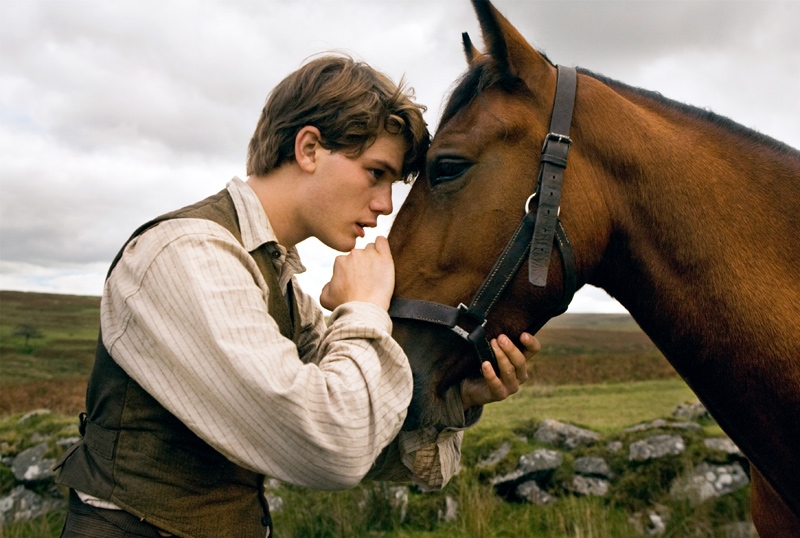Michael Morpurgo's
1982 young adult novel War Horse, certainly moderately
successful at the time, has sky rocketed in acclaim in recent years both in its
own right and perhaps even more importantly as an inspiration for artistic
adaptation. First there was the
theatrical tour de force adapted for Great Britain's National Theatre by Nick
Stafford, which in its Broadway incarnation was the winner of the Tony Award
for Best Play and is still running at Lincoln Center. And now, opening on Christmas Day comes the
much ballyhooed film adaptation by director Stephen Spielberg.
Perhaps because of
the National Theatre production's innovative solution to the problem of putting
horses on the stage through the use of giant puppets, it generated a fascinating
documentary called Making War Horse. The film, available on DVD, besides dealing
with the story itself, stresses the creation of the puppets in collaboration
with the Handspring Puppet Company and the training of the puppeteers necessary
to create the illusion of lifelike horses.
Not to be outdone, the film too has generated not a documentary as of
yet but an elegant "pictorial moviebook," War Horse: The
Making of the Motion Picture. No puppets it's true, but more than 140
brilliant photos from the film in their place.
Divided into three
sections the book takes you on a visual journey first through the film's story,
then its production and finally gives a short nod to the history of horses in
warfare. "Joey's Journey"
outlines the basic plot of the movie with stills from the film, comments from
the filmmakers and even an excerpt or two from the script. There are individual photos of the large cast
and brilliant shots of the British countryside.
But the really exciting visuals are those capturing the interaction of
men and the horses first on the farm and then at war.
The second section
takes you behind the scenes. While it
does provide some interesting insights like the ten different horses playing
the role of Joey and the shot of the makeup artist working on one of the equine
actors, the whole section runs little more than a dozen pages, much of it taken
up with commentary. "The History of
War Horses" uses illustrations from history to highlight the role of
horses from ancient Egypt through World War 1, with the emphasis on the latter. As history it is little more than a sketch,
and at best will whet the interested reader's appetite for something more
substantial. Still this is after all a
book about the making of a movie, and one can't expect a historical
dissertation.
There are
forewords by Spielberg, producer Kathleen Kennedy, who seems to have been the
originator of the project, screenwriter Richard Curtis, and author
Morpurgo. Curtis has an interesting
tidbit about how his film Four Weddings and a Funeral beat
out Spielberg's Schindler's List for a French foreign film
award, the kind of anecdote you can dine out on. Morpurgo talks about the writing of the novel
and somewhat fetchingly confesses his preference for cows over horses at the
time he was writing. One imagines recent
developments may well have changed his mind.
If the film
manages to garner the same kind of critical acclaim as the play, this is a book
that may well share that popularity.
Although it is quite well done in its own right, it seems to me that its
success is clearly tied directly to the success of the film.


No comments:
Post a Comment